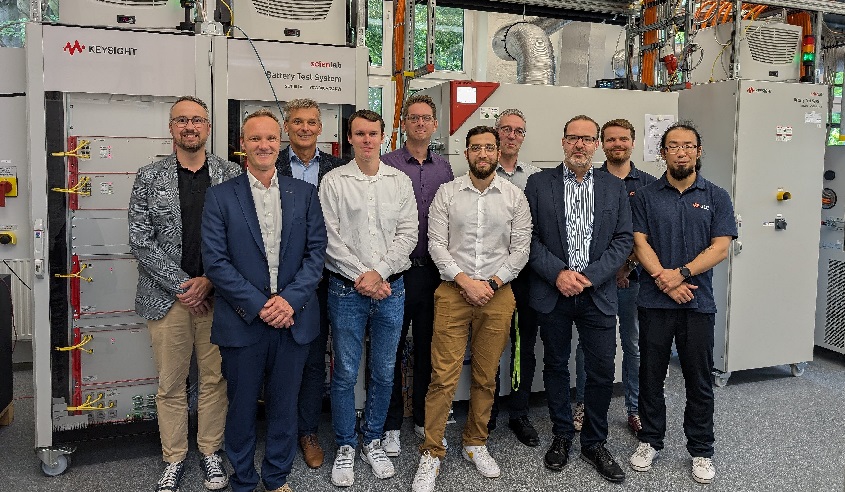By developing reliable testing and classification procedures, the project consortium comprising Second Life Batteries GmbH (project lead), BLC – The Battery Lifecycle Company GmbH, the University of Wuppertal, and Keysight Technologies Deutschland GmbH aims to enable used electric vehicle (EV) batteries to be utilised as stationary energy storage devices with guaranteed performance and efficiency.
This innovation is intended to support the market launch of “second life” batteries for both private and commercial applications.
Technical instruments and methods are already being developed to test used electric vehicle batteries.
In the future, an innovative testing device should be able to efficiently determine and assess the various states of the batteries.
These developments will enable selective utilisation of batteries and will be incorporated into the “battery passport” or Digital Product Passport (DPP), which contains information on the sustainability and life cycle of the batteries.
This will allow for reliable determination of the battery’s suitability for further use.
Prof. Dr Benedikt Schmülling from the Institute of Electric Mobility and Energy Storage Systems at the University of Wuppertal says: “The ‘Re-use’ project is an excellent example of how research and industry can collaborate to advance sustainable solutions.”
“At the University of Wuppertal, we are developing robust and reliable testing methods to optimise the reuse of electric vehicle batteries. This is a crucial step towards increasing resource efficiency and reducing environmental impact,” he adds.
Stefan Naust, Managing Director of Second Life Batteries GmbH and project coordinator, indicates: “The ‘Re-use’ project aims to create a marketable product from reused lithium-ion batteries.”
And he continue: “The goal is to develop a guarantee for the capacity and service life of the batteries to promote their widespread acceptance and use. The batteries will be redefined and offered based on their state of health.”
Mathias Nippraschk, Project Manager at BLC, concludes: “The use of end-of-life vehicle batteries as stationary power storage units will significantly increase the availability of storage capacities in stationary applications.”
“Manufacturers of stationary storage systems are currently competing with the automotive industry, which represents a very high demand for battery producers in the electrification of mobility. The use of certified ‘second life’ batteries can alleviate this bottleneck in the medium term,” he adds.
More Background: Enough “Juice” for Other Tasks
Certain chemical wear mechanisms that cannot be prevented mean that batteries are no longer powerful enough for use in electric cars.
Currently, it is common practice to replace, dispose of, or temporarily store electric vehicle batteries after a service life of up to eight years.
While the raw materials in these batteries are valuable, their recycling process is still very labour- and energy-intensive, significantly increasing the carbon footprint.
Furthermore, the process is not yet economically viable, as the value of the recovered materials does not cover the costs of the multi-stage recycling process.
It is noteworthy that, even after the vehicle manufacturer’s warranty expires, the removed batteries still retain 50 to 80 per cent of their original energy capacity.
This makes them suitable for many other applications.
For example, they can be used as power storage units for private households, emergency generators, or—when several batteries are interconnected—as large storage units for industries to store and utilise solar and wind power for production.
Reusing these batteries as stationary energy storage systems can significantly delay recycling processes.
This not only reduces CO₂ emissions but also helps alleviate the current shortage of recycling capacities.
The “Re-Use – Re-purpose of Electric Vehicle Batteries” project is funded by the state of North Rhine-Westphalia and the European Union as part of the GreenEconomy.IN.NRW innovation competition, with funds from the European Regional Development Fund and the Just Transition Fund (ERDF/JTF programme NRW 2021-2027).
The University of Wuppertal has around 718,000 euros at its disposal.
Read more: New eTruck challenge: Germany seeks solution to lack of data on EVs







